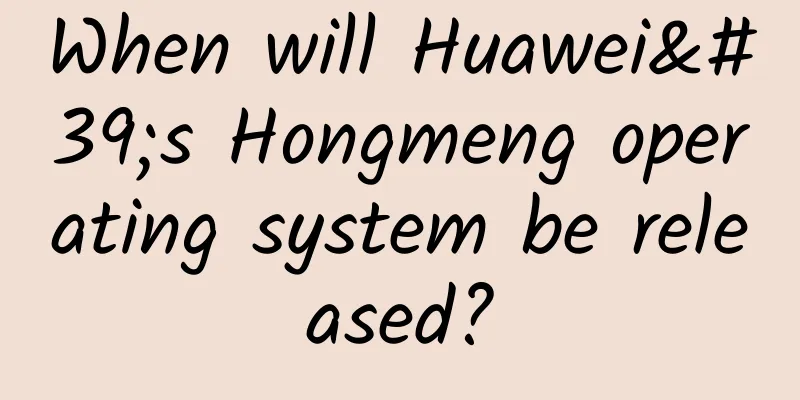When will Huawei's Hongmeng operating system be released?

|
For Huawei, the most noteworthy product at the moment, besides 5G, is its self-developed operating system Hongmeng. However, the difference between the two is that Huawei 5G has already released a wide range of products, forming an end-to-end solution, and Huawei founder Ren Zhengfei has repeatedly stated that Huawei 5G is world-leading; while Hongmeng has not yet made a public appearance. So the question is, when will Hongmeng be released? Will it be released in October at the earliest? Here comes the official response Recently, some overseas media published a report titled "Huawei's Hongmeng system will be released as early as October"; the report said that although US President Trump had publicly stated after the G20 that he would "loosen up" on Huawei, there is no clear statement on whether Google will be allowed to continue to license the Android operating system to Huawei. The report quoted a Huawei executive as saying that the Hongmeng system will be released as early as October this year and at the latest in April next year; and the report also believes that the Hongmeng system will be first released on Huawei's second half flagship model Mate 30 series or the P40 series in the first half of next year. However, Huawei officially denied the report. Huawei said that it has not mentioned the specific release time of Hongmeng system recently. Huawei also said: First, an open Android platform is still the first choice, and if possible, the Android system will continue to be used first. Second, the operating system is not difficult in terms of technology, but the ecosystem is difficult. Apple and Google have done a very good job in their ecosystems. In the past, Huawei has always supported the ecosystems of Apple, Google, and Microsoft and has always followed them. Third, Huawei's own operating system was previously a backup plan. If there is no other choice, it must survive. Huawei's statement can also be confirmed by what Huawei's Vice Chairman Ken Hu said at the recent MWC19 Shanghai media conference. Ken Hu said: Everyone knows that the operating system of Huawei's mobile phones is the Android system. We are a firm supporter of the Android ecosystem, and we can ensure that Huawei's mobile phone users will not be affected in any way when using the Android system... As for the current situation of Hongmeng, we are unable to disclose it at the moment, and there is no clear time for its launch. Simply put, there is no timetable for the launch of Hongmeng. Huawei's Hongmeng operating system's B-angle positioning In fact, Huawei's self-developed operating system can be traced back to 2012. However, it was not until March 2019 that the existence of this self-developed operating system was officially confirmed after the German media WELT interviewed Huawei's consumer business CEO Yu Chengdong. At that time, Yu Chengdong indicated its B-side positioning. Yu Chengdong's original words were: We have prepared our own operating system. Once a situation occurs where we can no longer use these operating systems (from Google and Microsoft), we need to be prepared. This is Plan B. However, we certainly prefer to cooperate with ecosystem partners such as Google and Microsoft. A few days later, on March 14, Huawei also issued an official statement on "Huawei's self-developed operating system", which also emphasized the B-side positioning of this system: Huawei does have alternative operating systems, but they are only used in extenuating circumstances. We are not looking forward to using our own system, and to be honest, we don't even want to use it. We fully support our partners' operating systems, we like them, and our customers like them too. Android and Windows will always be our first choice. However, in mid-May, as Huawei was listed on the "Entity List" by the US government, the news caused an uproar around the world, and Huawei's response was more intense and had a certain tragic atmosphere. Under such circumstances, Huawei's self-developed operating system began to receive intensive attention. Some netizens exposed its name - "Hongmeng", as well as related information, such as that Huawei's operating system team is led by Professor Chen Haibo, and has made a lot of optimizations to open source Linux, and its security part has been applied to Huawei mobile phones. On May 24, "Huawei Hongmeng" appeared on the website of the Trademark Office of the State Intellectual Property Office as a trademark related to the operating system (see previous reports by Leifeng.com for details). At the same time, Huawei also registered the "Hongmeng" trademark in many countries around the world - thus publicly announcing the Hongmeng operating system to the world. It is worth mentioning that shortly after the United States announced that Huawei would be included in the Entity List, Yu Chengdong stated in a non-public WeChat group that Huawei's operating system OS designed for next-generation technology may be available as early as this fall and at the latest next spring. The system connects mobile phones, computers, tablets, TVs, cars, smart wearable devices, and is unified into one operating system that is compatible with all Android applications and all Web applications; related Android applications are recompiled, and the running performance is improved by more than 60% on this operating system. Having said that, considering Yu Chengdong's nickname "Big Mouth Yu" and Huawei's special mentality under US suppression at the time, this statement obviously has some elements of demonstrating confidence and releasing confidence - Leifeng.com noticed that Yu Chengdong has not made any more public statements on the self-developed operating system since then. Is it a reversal? Or a change in strategy? So, when Yu Chengdong has already revealed the release time range of the self-developed operating system, why does Huawei currently say that the release time of Hongmeng is not clear? The reason for this seemingly contradictory and reversed situation may be found in Ren Zhengfei's recent intensive interviews. For example, on July 4, Ren Zhengfei also expressed his views on the Hongmeng system in the famous French news weekly "Point of View". He said that the operating system that Huawei is developing is compatible with printed circuit boards, switches, routers, smartphones, and data centers, and the system's processing delay is less than 5 milliseconds. It will be perfectly adapted to the Internet of Things and can also be applied to autonomous driving, and the purpose of this system is to connect all objects. It is worth mentioning that when asked whether Hongmeng OS is faster than Google's Android or Apple's Mac OS X, Ren Zhengfei gave the answer: "Very likely" and gave a technical argument. According to a previous report, Huawei's OS is 60% faster than Android (basically consistent with Yu Chengdong's previous statement). But at the same time, Ren Zhengfei also admitted that compared with Android, Huawei still lacks a good application ecosystem.
These views are also confirmed by Ren Zhengfei's statement in an interview with the Financial Times. He said: First of all, the Hongmeng system was not created for mobile phones, but for the Internet of Things, such as autonomous driving and industrial automation, because it can accurately control the latency to less than five milliseconds, or even to the millisecond to sub-millisecond level. Second , we hope to continue to use the global public and open mobile phone operating system and ecosystem, but if the United States restricts our use, we will also develop our own operating system. The most important thing about the operating system is to establish an ecosystem. It takes about two to three years to re-establish a good ecosystem. We are confident that we can build an ecosystem based on China and for the world. First, there are huge applications in the Chinese market. Compared with all Internet software, our system latency is very short. If some people think that it is well applied on this short-latency system, they will migrate part of their business to Huawei; second, a large number of Chinese content service providers are eager to go overseas, but they cannot go out. They can go out by carrying our system. It can be seen that Ren Zhengfei (and Huawei) actually have a clear understanding of the Hongmeng operating system. On the one hand, he has sufficient confidence in Hongmeng, but on the other hand, he also admits that Hongmeng is insufficient in the operating system ecosystem; at the same time, Huawei will continue to use the public and open mobile phone operating system and ecosystem, and Hongmeng is a backup role. Leifeng.com (Official Account: Leifeng.com) believes that another factor that cannot be ignored in Huawei's specific deployment of the Hongmeng operating system is the changes in the external environment it faces. For example, at the beginning, Huawei's Mate 20 and other models were removed from the Android Q test list by Google, but the list was restored two weeks later, and Google is actually actively seeking a cooperative relationship with Huawei; especially after the G20 summit, Trump's statement on Huawei is actually a relaxation of the previous suppression trend, which to some extent also reduces the urgency of the launch of the Hongmeng operating system. It is worth mentioning that according to a report by Reuters a few days ago, Huawei said it is waiting for instructions from the US Department of Commerce on whether it can resume using Google's Android system on its next smartphone. In any case, the situation is still uncertain, and Huawei must be prepared for both situations. This article is reproduced from Leiphone.com. If you need to reprint it, please go to Leiphone.com official website to apply for authorization. |
<<: So many apps collect user data without permission Google: Android 10.0 will solve this problem
Recommend
Momo information flow advertising skills, play with pan-entertainment social information flow advertising!
Written in front Momo is a pan-entertainment soci...
China's Antarctic Qinling Station opens! Do you know about China's Antarctic Scientific Research Station?
China's Qinling Antarctic Station is located ...
Baidu search account setup process!
A good account structure, like a solid foundation...
This time, it’s not just about going to the North Pole! Chinese scientists realize their dream of reaching the North Pole!
If someone has visited the North Pole and checked...
A 44-year-old famous actress revealed that she has been using reading glasses! A 39-year-old civil aviation captain has set the font on his phone to be super large! Can presbyopia be cured?
Recently, 44-year-old actress Joe Chen posted on ...
Did you sleep well today?
This is the 3602nd article of Da Yi Xiao Hu A bus...
LG's eye-opening curved OLED TV gives you what you want
LG Curved OLED65EC9700-CA is an OLED ultra-high-d...
The turning point of the TV industry: Internet surpasses traditional brands starting from this year's 11.11
It has to be said that with the development and a...
Advanced Sports Nutrition Baidu Cloud Download
Course Catalog ├──Diet for weight loss | ├──Nutri...
How much does it cost to develop a security monitoring applet with functions and a customized smart prevention and control applet?
As people's safety awareness continues to imp...
How to use the points system to stimulate user retention
A reasonable points system generally consists of ...
Is "8 glasses of water a day" true knowledge or pseudoscience? Let's clarify the matter of drinking water today!
gossip I believe everyone has heard of the phrase...
Chery Shuxiangjia VS Leapmotor C11: Traditional car companies and new forces, which electric SUV is more professional?
The competition between traditional car companies...
How to choose keywords for APP promotion? Come quickly!
Studies have shown that in app stores, 65%-70% of...
How to promote and attract traffic to Douyin store?
Many merchants who sell things on Douyin have ope...









